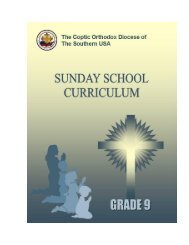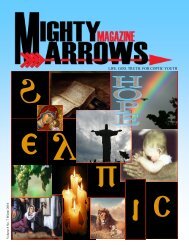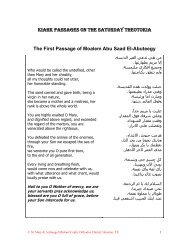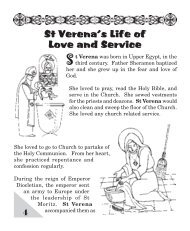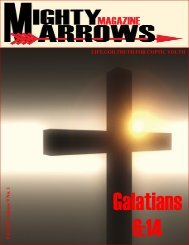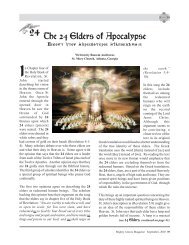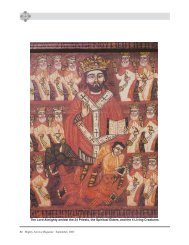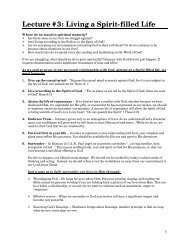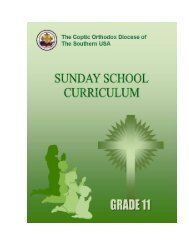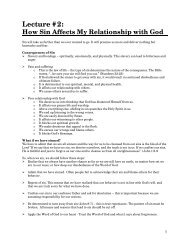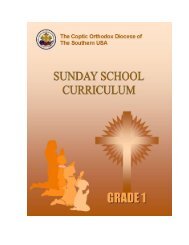Grade 12 - Coptic Orthodox Diocese of the Southern United States
Grade 12 - Coptic Orthodox Diocese of the Southern United States
Grade 12 - Coptic Orthodox Diocese of the Southern United States
Create successful ePaper yourself
Turn your PDF publications into a flip-book with our unique Google optimized e-Paper software.
Sunday School Curriculum <strong>Grade</strong> <strong>12</strong><br />
Spending eternity in <strong>the</strong> presence <strong>of</strong> Christ, <strong>the</strong>y will, however, be deprived <strong>of</strong> fellowship with<br />
Elohim and full exaltation to godhood.<br />
Finally, <strong>the</strong> righteous Christians will be raised to <strong>the</strong> ―Celestial Kingdom.‖ There, in <strong>the</strong> presence<br />
<strong>of</strong> Elohim, <strong>the</strong>y will share in his glory and will become gods <strong>the</strong>mselves. Those in <strong>the</strong> Celestial<br />
Kingdom will even be able to have spirit children and to become gods <strong>of</strong> <strong>the</strong>ir own worlds, just as<br />
Elohim became <strong>the</strong> god <strong>of</strong> this world.<br />
In order for a person to enter into <strong>the</strong> highest level <strong>of</strong> <strong>the</strong> Celestial Kingdom, he must fulfill<br />
certain obligations. He must be baptized by immersion in <strong>the</strong> name <strong>of</strong> ―<strong>the</strong> Fa<strong>the</strong>r, <strong>the</strong> Son, and <strong>the</strong><br />
Holy Ghost,‖ and must receive <strong>the</strong> Holy Spirit by <strong>the</strong> laying on <strong>of</strong> hands from an elder in <strong>the</strong><br />
Mormon Church. Every person aspiring to godhood must also enter into a ―celestial marriage‖ for<br />
eternity in a special ceremony in a Mormon Temple.<br />
As gods, men and women in <strong>the</strong> Celestial Kingdom will be able to give birth to <strong>the</strong>ir own<br />
spiritual children and organize <strong>the</strong>ir own worlds for <strong>the</strong>m— just as Elohim became <strong>the</strong> god <strong>of</strong> this<br />
world, which he populated with his own spiritual sons and daughters.<br />
H. The Priesthood and <strong>the</strong> Temple<br />
Mormonism places great emphasis on its priesthood, claiming to be a restoration <strong>of</strong> <strong>the</strong> true<br />
Church by virtue <strong>of</strong> its exclusive possession <strong>of</strong> <strong>the</strong> Melchizedek Priesthood. Before a person may<br />
advance to <strong>the</strong> higher priesthood, he must first pass through <strong>the</strong> three ranks <strong>of</strong> <strong>the</strong> lower Aaronic<br />
Priesthood. Named after <strong>the</strong> first Jewish High Priest, Aaron, <strong>the</strong> lesser priesthood <strong>of</strong> Mormonism<br />
consists <strong>of</strong> deacons, teachers, and priests.<br />
Following advancement through <strong>the</strong> Aaronic Priesthood, a man is eligible to enter <strong>the</strong><br />
Melchizedek Priesthood. Named for Melchizedek <strong>of</strong> Genesis, <strong>the</strong> higher priesthood <strong>of</strong> Mormonism<br />
consists <strong>of</strong> five levels: elders, seventies, high priests, patriarchs, and apostles. In each area one high<br />
priest has <strong>the</strong> <strong>of</strong>fice <strong>of</strong> bishop <strong>of</strong> <strong>the</strong> ward, a group <strong>of</strong> stakes. One high priest serves as <strong>the</strong> chief<br />
executive <strong>of</strong>ficer <strong>of</strong> <strong>the</strong> Mormon Church, <strong>the</strong> First President, who is believed to possess special<br />
prophetic powers and to act as a spokesman for God. Twelve apostles form a council to advise <strong>the</strong><br />
First President.<br />
The temples are central to <strong>the</strong> exercise <strong>of</strong> <strong>the</strong> Mormon priesthood. Here, in absolute secrecy, <strong>the</strong><br />
faithful participate in elaborate ceremonies, complete with secret handshakes and special clothing, to<br />
receive <strong>the</strong> Endowments <strong>of</strong> <strong>the</strong> Priesthood and to be married for eternity. They also participate in<br />
baptism, ordination, and even marriage services for <strong>the</strong> departed. Mormons wish to extend <strong>the</strong><br />
blessings <strong>of</strong> <strong>the</strong>ir faith to <strong>the</strong>ir ancestors and spend a great deal <strong>of</strong> time and effort in extensive<br />
genealogical research to learn <strong>the</strong> names <strong>of</strong> <strong>the</strong>ir ancestors. Then <strong>the</strong>y are united in celestial marriage<br />
and prepared for exaltation to godhood in <strong>the</strong> world to come.<br />
The Mormons have built sixteen temples, twelve in <strong>the</strong> <strong>United</strong> <strong>States</strong> and o<strong>the</strong>rs in Canada,<br />
England, Switzerland, and New Zealand. The most famous temple is in Salt Lake City, <strong>the</strong><br />
headquarters <strong>of</strong> <strong>the</strong> Mormon Church. Only members <strong>of</strong> <strong>the</strong> church in good standing may enter a<br />
temple, and no part <strong>of</strong> <strong>the</strong> ceremony may be disclosed to an outsider. Thus, like <strong>the</strong> ancient Gnostics,<br />
<strong>the</strong> Mormons teach that only those who are admitted to secret knowledge can achieve <strong>the</strong> highest<br />
level <strong>of</strong> salvation.<br />
Actually, <strong>the</strong> rites <strong>of</strong> Mormon temples bear no resemblance to <strong>the</strong> worship <strong>of</strong> <strong>the</strong> temple <strong>of</strong><br />
ancient Jerusalem or to <strong>the</strong> worship <strong>of</strong> any Christian Church. There is no praise <strong>of</strong> God or reading<br />
from Holy Scripture, or any o<strong>the</strong>r act usually associated with worship. Indeed, <strong>the</strong> services are more<br />
like <strong>the</strong> initiation rites <strong>of</strong> a fraternal organization than services <strong>of</strong> worship.<br />
88 DECEMBER



